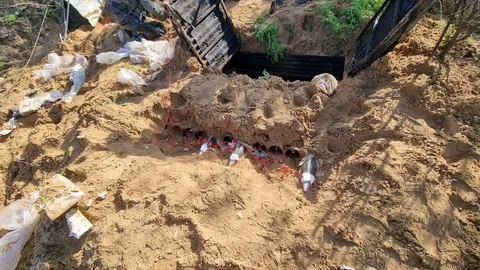Attack in Lebanon kills Hezbollah military chief ahead of Blinken's arrival in Israel

US Secretary of State Antony Blinken is visiting Israel on Monday to try to de-escalate the conflict in Gaza and prevent it from spreading to Lebanon, where, according to a security source, an Israeli strike killed a Hezbollah military leader.
The military leader "played a leading role in directing military operations in the south", where exchanges of fire between the pro-Iranian Lebanese movement and the Israeli army are almost daily, added the source, who requested anonymity.
According to Hezbollah, he is "commander Wisam Hasan Tawil". He is the highest-ranking Hezbollah military officer to die since the powerful movement opened a front with Israel in support of Palestinian Hamas.
He was killed in the village of Kherbet Selm, about ten kilometres from the Israeli border, while driving his vehicle, according to the security source.
Rising tensions in the area are fuelling fears of a regional conflagration, as the war between Israel and the Palestinian Hamas movement in Gaza enters its fourth month.
At a stop in Qatar on Sunday, Blinken warned that the conflict "could easily metastasise", but added that his country is working to "prevent" the war from "spreading" across the region.
After a stop in Saudi Arabia, he will arrive in Israel on Monday evening. On Tuesday, he will hold what are expected to be tense meetings before travelling to the occupied West Bank and Egypt on Wednesday.
According to US officials, the Secretary of State wants at all costs to prevent Lebanon from being drawn into the war, to convince Israel to enter a new, less lethal military phase and to engage in a "difficult" post-war dialogue.
Israel vowed to destroy the Palestinian Islamist group Hamas after its 7 October attack on its territory that left some 1,140 people dead, according to an AFP count based on Israeli figures.
Hamas also took 250 hostages, of whom some 132 remain captive in Gaza.
Qatar, which mediated the release of hostages in late November, is continuing its efforts to return those still held captive, said the father of one hostage, Ruby Chen, who met with Qatari leaders.
Israel's offensive in Gaza in retaliation for an attack by the Palestinian Islamist group has so far left 23,084 people dead, the vast majority of them children and women, according to Monday's figures from the health ministry of Hamas, which rules the tiny Palestinian territory.
The bombing has also left several Gaza neighbourhoods in ruins, displaced 85% of the population and caused a humanitarian crisis of catastrophic proportions, according to the UN.
The World Health Organisation (WHO) announced that it had to cancel deliveries of urgent medical supplies to northern Gaza for the fourth time since late December due to a lack of security guarantees.
"No place safe"
According to the Hamas government, Israeli operations killed 249 people and injured 99 in the last 24 hours in central Gaza.
The Israeli army announced strikes in Khan Younis, the main town in the south of the besieged territory and the new epicentre of the fighting, killing "ten terrorists preparing to launch rockets at Israel".
On Monday morning, an attack in Rafah, in Gaza's far south, also destroyed a vehicle from which rescuers and residents were removing bodies, according to AFPTV.
"We were told Rafah was safe, but (...) there is nowhere safe, we don't know what to do," laments Gazan Mohammad Hejazy.
Hundreds of thousands of residents have flocked to Rafah to escape the fighting further north.
Two journalists working for Al Jazeera, Mustafa Thuria and Hamza Wael Dahdouh, were killed on Sunday in an attack on their vehicle in Rafah. A third journalist with them, Hazem Rajab, is seriously injured.
The Israeli army claimed responsibility for the shooting, telling AFP that it was aimed at "a terrorist piloting a flying device that posed a threat to troops", and that it was "aware of reports that two other suspects travelling in the same vehicle were also hit during the attack".
These deaths bring to at least 79 the number of journalists and media professionals, mostly Palestinians, killed since 7 October, according to the Committee to Protect Journalists.
The UN, "deeply concerned" by the high number of journalists killed in Gaza, called for a "thorough and independent investigation" into these events.
The conflict has also sparked violence in the West Bank occupied by Israel since 1967.
Nine Palestinians were killed there on Sunday, seven of them in an Israeli raid in Jenin, a stronghold of Palestinian armed factions in the territory, where an Israeli policeman and an Israeli civilian were also killed.









